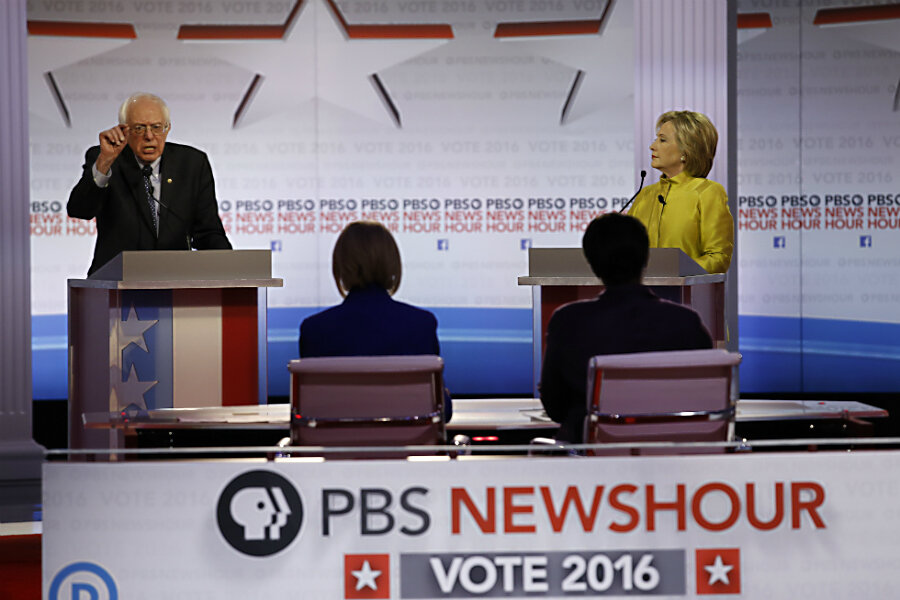Sanders' boost for Clinton; immigration fears; Trump in Africa; France's right wing; Syria peace talks
Loading...
Deutsche Welle / Bonn, Germany
How Sanders could propel Clinton
“Nobody but [Bernie] Sanders’ most fervent fans really believes that the self-proclaimed Democratic socialist can actually win a majority in the whole country and secure the Democratic nomination. His ideas are too far-fetched, his political concepts too elaborate and his agenda too narrow,” writes Ines Pohl. “In terms of foreign policy, he simply cannot compete with Hillary Clinton, as has become increasingly clear in the debates. But he and his grassroots supporters are now the counterweight needed by Clinton so that she is not forced to go in a certain direction by [Donald] Trump and [Ted] Cruz. She has to uphold her liberal ideas of society if she does not want to give Sanders more ammunition.”
The Guardian / London
Address underlying fears about immigration
“The migrant crisis [in Europe] is a longstanding one.... Indeed, the key problem lies not at the level of policy at all, but at the level of attitude and perception...,” writes Kenan Malik. “Liberal immigration policies can be enforced only by winning public support, not in spite of public opposition.... Large sections of the public have become hostile because they have come to associate immigration with unacceptable change. That is why, paradoxically, the immigration debate cannot be won simply by debating immigration, nor the migration crisis solved merely by enacting migration policies. Anxieties about immigration are an expression of a wider sense of political voicelessness and disengagement. Until that underlying political problem is tackled, the arrival of migrants on Europe’s shores will continue to be seen as a crisis.”
The New Times / Kigali, Rwanda
Would Trump have an Africa policy?
“On the campaign trail in Indianapolis, [Donald Trump] lashed out at Africans, saying that they need another 100 years of recolonisation because they know nothing about leadership and self-governance. There is also his irreverent description of Africans as lazy fools who are only good at eating, lovemaking and thuggery,” writes Gitura Mwaura. “This says a lot about the racial attitude of a man with presidential ambitions for the US, a nuclear-laden world leader-cum-police no less.... [A]ccording to a US nationwide poll of voters by Quinnipiac University, 88 per cent of black respondents answered ‘no’ when asked if Mr Trump ‘cares about the needs and problems of people like you.’ But what would be the United States’ Africa policy for a Trump presidency? Perhaps it is best not to contemplate it – for now. Though it is certain realpolitik and the ways of the world would jolt him to national and international realities many believe he is yet to grasp.”
Les Echos / Paris
France’s right wing waits to rise
“[A] National Front victory in France’s most important election of the year isn’t the likeliest outcome, for now. The rise of the nationalist party has been a recurring feature in French politics over the past 30 years, but has so far fallen short...,” writes Jean-Marc Vittori. However, National Front president Marine Le Pen could “benefit from two potential crises. The first would be a national security crisis, with more terrorist attacks. The second crisis could be a social one, if unemployment doesn’t fall.”
The Japan News / Tokyo
Syria peace talks need clear next steps
“Peace talks aimed at ending Syria’s civil war have started in Geneva under the mediation of the United Nations, marking the first such talks in about two years. Negotiators will discuss how to implement a road map to establish a new Syrian government...,” states an editorial. “Lessons must be learned from the series of Arab Spring popular uprisings five years ago, in which long-term autocratic regimes were toppled in Libya and Yemen, producing a power vacuum and triggering civil wars and a spate of terrorism. The United States, Russia and other countries concerned need to cooperate in drawing up a blueprint for establishment of a stable government in Syria.”







